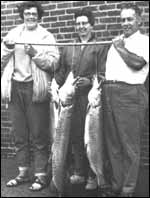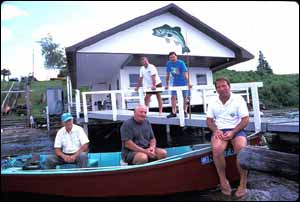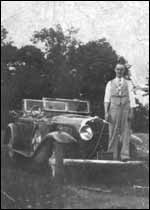

| Picture Caption: Al Russell of Red Mills, posing with two Vermont women and their day's catch of muskies, summer 1960. [Courtesy of Al Russell] |

AL RUSSELL
"The Boys from Chicago and Their Illegal 'Catch'"
One time I'll never forget. I had two guys that were Watsons from Chicago, and both six foot six. One probably weighed three hundred and the other probably weighed three hundred and twenty. So you can imagine me beside 'em. And they got one [a muskie or muskellunge] about forty inches, and I had 'em measure right on the back of the boat, sixty inch measure. So I laid it and I said, It's only forty inches, I says, We gotta throw it back. [44 inches is legal minimum]. And both of 'em were drinking quite a bit. And the biggest one was the kid, his son. He stood up, he says, 'You try to throw that back, you're gonna be in the river before that fish.' I says, We can't keep it, it's illegal. Not a - it's against the law. He says, 'That ain't against the law. It's against the law for me to throw you in the river, and that's what's gonna happen if you throw it in, so help me. You'll swim to shore!' And both of 'em were drinkin' and I didn't trust 'em. But I quit fishin' right then and there, and I own a boat house and cottage up here. I own Red Mills point where all the mills used to be, is where my boat house us. And we come in there, and they kept it and come in. I says, Don't show it to anybody, you'll get fined. So they says, 'Don't worry. But that's the biggest fish I ever see in my life, and you ain't gonna throw it back, because I caught it. So he says, the next morning, 'Al, you still mad at us? I said, What do you think? Somebody threatens to throw you in the river, it's the same thing as threatnin' your life. He says, 'You gonna turn us in?' I says, No, not if you get the hell out of here with it. He says, 'Where can I buy some fish?' So I sent him down to Hogansburg [Mohawk reservation at Akwesasne], down to the Indians. About three hours later, they were back in. He says, 'You want to know what I bought?' I says, What? Don't show me, just tell me. 'We bought a hundred and twenty bass.' They'd a went to jail for ten years if the game protectors had caught 'em. I says, Why don't you head right for Chicago, right here now? They says, 'That's what we're gonna do.'
| Picture Caption: Men of the Hollis family in a family-built "Hollis punt' by their summer camp near Red Mills. Front, l to r, William, Jack, Chuck; back, l to r, Dick, Bill. [Martha Cooper photo, TAUNY Archives] |

WILLIAM, DICK & BILL HOLLIS
"A Boat in Every Yard"
William Hollis: Well, I "member the first boat that he made. I was in school, of course, and, and everybody was comin' in like Clarence Seguin, which was a neighbor of ours down at the camp here, and we duck hunted together out alla time, and they'd be over there, and there was a, a steamboat, they called it the Leviathan, which I never seen before. But they had it and them guys sailed on it. And so they started to call that boat the Leviathan, 'cause it was one of the bigger punts that was ever, and Dad ever made at that time, 'course that was a plank bottom boat like everybody built, built them days. And of course my father built them. From that time on, and then when I got out of the service, I built my first one I guess I could say. And that's how I got goin' on the boat business. Then these guys followed through on it.
Bill Hollis: You had to make your own if you wanted one, eh?
William Hollis: Yeah. Well, see everybody had wooden boats them days, God, and the river was full of boats. You'd go up through Ogdensburg any time and you'd see a boat in the yard bein' built
"How the Boys Started Duck Hunting"
William Hollis: I grew up through my father and then these guys followed me. Back when my father hunted ducks, there was a lotta redheads and canvas back ducks around. In other words, there was a lotta ducks around in them days. It aint like that today. It's tough pickin' today. There's no more canvas backs, redheads.
Dick Hollis: Not around this area.
Bill Hollis: We all started goin', in fact, I don't know how my father ever did it, "cause I got one boy, and I can take the one kid huntin' without much problem. But he had three, one year apart, so when it was time Saturday morning, time to go duck huntin', he had to look at all three of "em, then he took all three of us.
William Hollis: My wife used to say, 'Well, I don't like to take them all. Gee, I take three kids duck huntin', it's a hard job. Well, let's see, you were'
Bill Hollis: I was the youngest......
William Hollis: Tear run down, 'cause he couldn't go, you know. I, c'mon, get your clothes out and just...I'd take 'em all.......
Dick Hollis: Yeah. Lotta guns in the blind, but no more ducks fell.
William Hollis: Well, we all liked it, I know that.
 |
WILLIAM HOLLIS
"The Decoy Decoy!"
William Hollis: Emerson Gonyea, little bitsy short fella, little cocky guy, and he run, had a store. Well, every night, Bounder'd have to go over to the store, over to the Hospital Point and pick 'em up. He come down there by bus, pick him up, take him over, hunt that morning for awhile, take him over, he'd go back to work. So we were all in there, havin' a beer, Dad and I and Bounder. I said, I said, 'Boy, we could fi - fix up a decoy to pull onto the water and get that Emerson to shoot at it.' Well, we did, him and I went over the camp and took a ring off of the minnow box, wired it on the stone and took an old decoy. I'm glad we took an old one, and you know, run it through the ring and up onto the island and I went back in there, and I tied it to, pulled the decoy down and tied it there, see? So anyhow, daybreak come and there wasn't a shot fired, you know, wasn't a duck around. So we - I said to Dad - I'll go down let the decoy out, see? Emerson, I did it right where their decoy house would be, where they'd be huntin', see. So I went down through the brush pile, down, and Bounder was waitin' for me, and lucky he saw me back in there, see? I let that decoy up, and Bounder said, 'Gee, Em,' and he went bang-bang, just like that. And I pull it right down, see. I did that about four times, then Bounder got scared, 'He's gonna get mad.' So he said, 'Don't do it no more,' so I tied it down and he was dealin' from here, here to you, Rick, from me. I was up in the brush and he said, 'I seen them sons-a-bitches do that before. Come up in the same spot,' he says. Right beside the string, he never saw the string. But that's one of the characters we had down there. Jeez, that was funny
Dick Hollis: What'd the decoy look like when he was done?
William Hollis: And I tied it down then so he wouldn't know, see? Yeah. Emory Mashaw come over to get him that morning to go to take him to work. Emory come sailin' in with a motor boat, caught the string up come the duck. Emerson says, 'You sons-a-bitches,' oh, I can't tell ya what he didn't say. [Laughter] Oh, he called us everythin'. That decoy was all shot up.
| Picture Caption: Mark Coakley stands on the bumper of his 1928 LaSalle, which had been confiscated by customs officers in Ogdensburg for being used in smuggling liquor from Canada, and later bought back by Coakley in 1930 for $28.00. [Courtesy of Mark Coakley] |

MARK COAKLEY
"The Border Patrol and the Missing Jacket"
There's a bar off the marina here in Ogdensburg. The ferry's come around between the bar and the marina and off loaded passengers that the border patrol would check. We'd come across from Canada and wait in our boats out from that bar. When the lights in the customs building went out, a guy in a bread truck'd pull up, swing in behind the customs and we'd load up. The border patrol guys lived right up the street. You'd see 'em walkin' home. No sooner were they outta sight when the bread truck'd come in. The border patrol here wasn't bad. One time a guy said to me, 'Come here, you.' I said, 'Whaddaya want?' I thought I was in trouble. He said, 'Here's your jacket. You left it at the river.'
©2001 Traditional Arts in Upstate New York